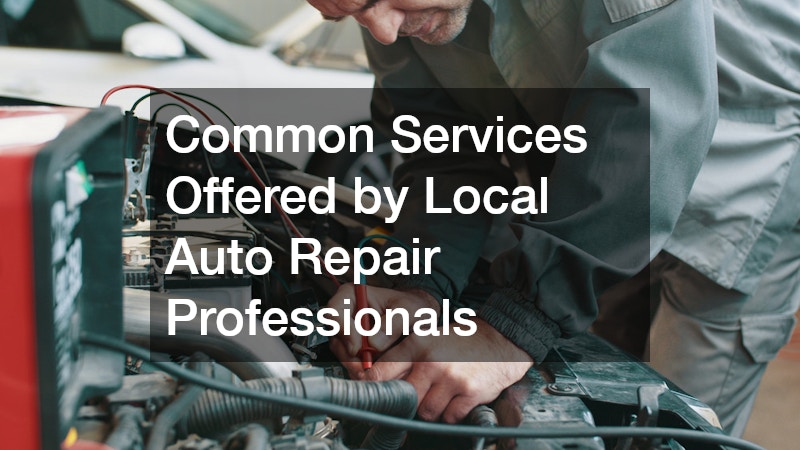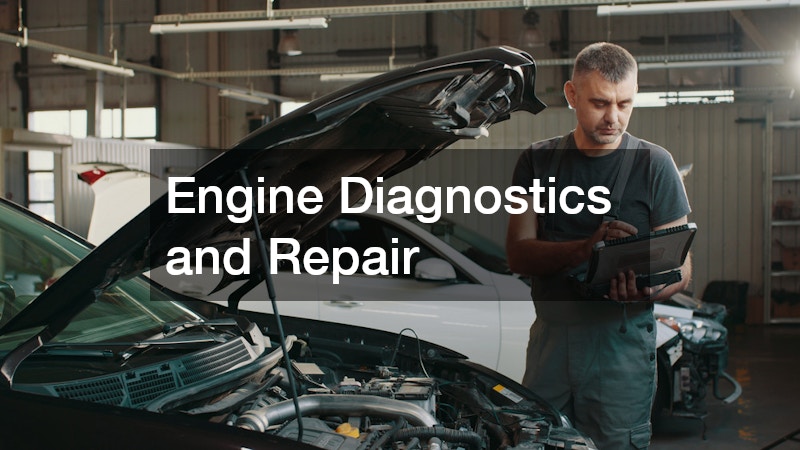
Common Services Offered by Local Auto Repair Professionals

This article explores the diverse range of services typically offered by local auto repair professionals, helping vehicle owners understand and access necessary maintenance and repair options to ensure their vehicles remain in optimal condition. Maintaining a vehicle involves more than just fuel and cleaning; it requires regular check-ups and repairs from skilled professionals. Understanding these services can empower car owners to take proactive measures in maintaining their vehicles’ health.
Routine Maintenance and Oil Changes
Routine maintenance is a cornerstone of vehicle longevity and performance. It often includes oil changes, which are critical as they provide lubrication for the engine, preventing wear and reducing heat friction.
Regular oil change intervals help keep engines clean and enhance their efficiency, reducing the risk of costly repairs down the line.
Beyond oil changes, many routine services include checking fluid levels, inspecting tire conditions, and assessing essential parts like belts and hoses. Regular maintenance can catch minor issues before they develop into major problems, saving both time and money. Local auto repair professionals advise maintenance schedules tailored to specific vehicle models and the owner’s driving habits.
Routine maintenance appointments also offer an opportunity for repair professionals to educate vehicle owners. They often inform drivers about best practices for maintaining their vehicles between visits. Through detailed visual inspections and professional insights, car owners can extend the lifespan of their vehicles and enjoy improved performance.
Brake System Repair and Replacement
The brake system is crucial for vehicle safety, requiring occasional diagnostics, repairs, and sometimes replacements. Auto repair professionals inspect brake pads, rotors, and fluid levels to ensure top performance. Early signs of brake wear, such as squeaking noises or reduced responsiveness, often indicate the need for professional attention.
Ignoring brake issues can lead to increased repair costs and heightened safety risks. Professionals use specialized tools to measure brake pad thickness and rotor integrity, providing precise assessments. Regular checks and timely repairs ensure drivers have reliable stopping power when it’s most needed.
Engine Diagnostics and Repair
Engine diagnostics are essential for identifying and resolving performance issues that can affect a vehicle’s functionality. Modern vehicles are equipped with complex engines where minor malfunctions can lead to significant problems. Repair professionals utilize diagnostic tools to scan for error codes and pinpoint issues efficiently.
Common engine-related services range from simple tune-ups to complete engine rebuilds. During diagnostics, mechanics assess components like spark plugs, fuel injectors, and timing belts. By addressing these issues promptly, car owners can prevent breakdowns and maximize engine performance.
Electrical System Inspection and Repair
The electrical system is an intricate network powering essential vehicle components. Repair professionals perform thorough inspections of the battery, alternator, and starter to ensure reliable functionality. Battery health is crucial; a weak or failing battery can lead to starting issues and affect vehicle electronics.
Alternators play a vital role in charging the battery and powering electrical systems while the engine runs. Technicians test alternator output to ensure it meets manufacturer specifications. Early detection of alternator issues can prevent vehicle stalling and preserve battery life.
Computer Diagnostics and Performance Testing
Computer diagnostics involve utilizing advanced technology to interpret data from a vehicle’s onboard computer system. Such diagnostics facilitate quick and accurate problem identification, covering everything from engine and transmission performance to minor sensor malfunctions. Technicians analyze this data to determine effective repair strategies.
Performance testing often reveals issues that aren’t immediately apparent. For instance, a vehicle may exhibit subtle signs like reduced power or inefficiencies that only show up under diagnostic review. This proactive approach allows technicians to address potential problems before they escalate, improving vehicle reliability and efficiency.
Addressing Sensor and Module Malfunctions
Sensors and modules are integral parts of modern vehicles, feeding critical data to various electronic systems. Common malfunctions can include faulty oxygen sensors, malfunctioning airbag modules, or incorrect outputs from mass air flow sensors. Repair professionals are adept at interpreting diagnostic codes to identify faulty components swiftly.
Timely sensor repairs can prevent more complex issues and maintain optimal vehicle performance. For example, a dysfunctional oxygen sensor can lead to poor fuel economy and increased emissions, but a simple replacement resolves these issues. Electronic control modules are also frequently updated or replaced as needed to ensure optimal functionality.
Expertise and Knowledge of Local Vehicles
Local repair professionals often possess in-depth expertise on common vehicle models prevalent in their area. This knowledge allows them to quickly spot and address model-specific issues, creating efficient diagnostic and repair plans. Familiarity with local driving conditions further informs their understanding of potential vehicle stressors and necessary adjustments.
By understanding the array of services available and the benefits of engaging local auto repair professionals, vehicle owners can make informed maintenance and repair decisions, leading to safer, more reliable, and longer-lasting vehicles. Trusting local experts not only assures high-quality repairs but also fosters community bonds and customer satisfaction. Ultimately, staying proactive with vehicle care today ensures fewer headaches on the road tomorrow.



